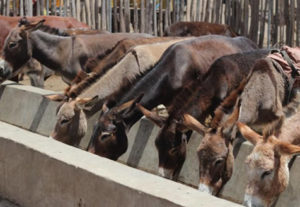WFP inaugurates Donkey-Cart transportation project in Upper East
 The World Food Programme (WFP) has handed over donkeys and twenty-four wheel carts to women farmers in five districts in the Upper East Region.
The World Food Programme (WFP) has handed over donkeys and twenty-four wheel carts to women farmers in five districts in the Upper East Region.
This is to help in the transportation of agriculture produce, reduce drudgery and post-harvest losses.
Sixty donkeys and 24-wheel carts with other accessories were given to 20 women lead farmers from 10 farmer-based organizations in 10 communities from the five districts including the Bawku Municipal, Tempane, Bawku West, Binduri and Bongo Districts.
The labour-saving transportation initiative dubbed “Donkey-Cart Transportation Project” is being implemented in collaboration with the Savannah Agriculture Research Institute (SARI), Manga Station, and the Upper East Regional Directorate of the Ministry of Food and Agriculture (MoFA).
The pilot project, with funding support from the Government of Canada, is set to benefit over 1,500 farmers in the region and forms part of the WFP’s Enhanced Nutrition and Value Chains (ENVAC) initiative and the Sustainable Food Systems component of the WFP Ghana’s 2019-2023 country’s strategic plan.
Speaking during the inauguration of the project at Manga in the Binduri District, Ms Rukia Yacoub, the Representative and Country Director of WFP, said the move is to enable farmers, particularly women who are the most vulnerable in terms of access to transportation, carry their farm produce from the farms to their homes, storage facilities and markets.
She said the effort is geared towards reducing the incidence of carrying loads on their heads, post-harvest losses, as well as boost the quality and quantity of food produced to achieve the Sustainable Development Goals.
“Research shows that globally, in developing countries, 40 per cent of food losses amounting to $310 billion, occur at the post-harvest and processing stages, while in industrialized countries, more than 40 per cent of food waste, roughly $680 billion, happen at the retail and consumer levels.
“Despite constituting over 50 per cent of the agricultural labour force, women in Ghana, still lack access to basic farm inputs and machinery, land, credit, and market opportunities that will enable them to increase their productivity and income,” Ms Yacoub said.
The Country Director said there is the urgent need to empower rural farmers to improve not only nutrition, health and education outcomes but to further bring about long term economic and social benefits to families and the entire nation.
While commending the Canadian government for sponsoring the project, she urged the beneficiaries to use the support to improve upon their livelihoods to enable them use their success stories to secure more funding.
Dr Francis Kusi, the Project Coordinator, SARI, Manga Station, said the project is particularly beneficial to the rural poor women farmers who could not afford the means of transport.
He said as part of the project, capacities of farmer groups have been enhanced in record keeping, welfare for working donkeys, breeding donkeys, business development and post-harvest management among others.
Madam Paulina Patience Abayage, the Upper East Regional Minister, on behalf of the women, expressed gratitude to WFP, SARI and the Canadian government for their support over the years and said it would effectively boost the implementation of government’s flagship programme, Planting for Food and Jobs and the Ghana Beyond Aid agenda.
The Regional Minister said she is committed to working closely with SARI and the department of Agriculture in the region to replicate the technology in other districts.
Source: GNA
